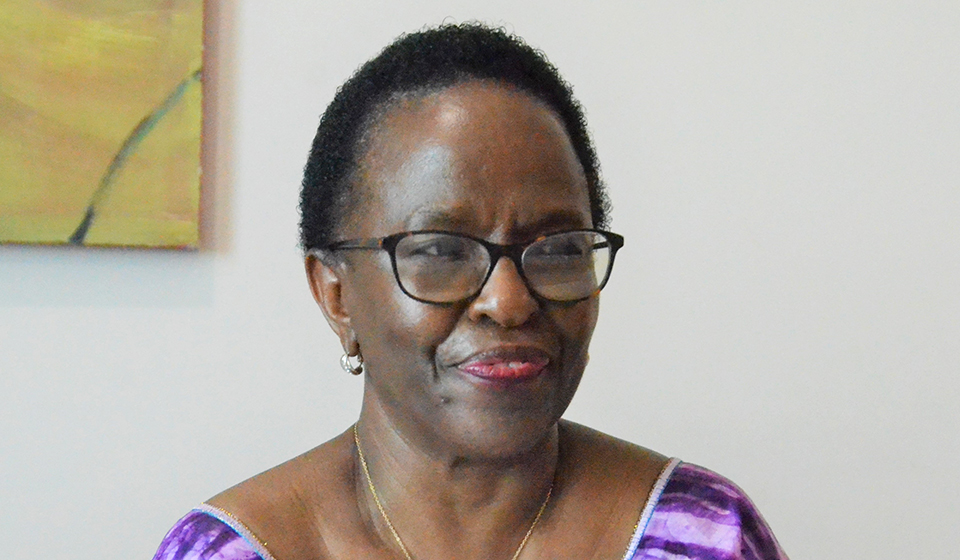Take Five with Ambassador Liberata Mulamula: Placing women at the front and center of Africa’s peace and security agenda
Ambassador Liberata Mulamula is a Visiting Scholar/Associate Director at the Institute for African Studies, Elliott School of International Affairs at George Washington University. She possesses extensive experience working in diplomacy and on issues of women’s peace and security in Africa. She is a member of the UNSG’s Sixth Peacebuilding Fund Advisory Group and the African Women Leaders Network steering committee, and previously served as served as the first Executive Secretary of the International Conference on the Great Lakes Region.Date:

You have been recently appointed to the UNSG’s Sixth Peacebuilding Fund Advisory Group. What immediate actions would you like to embark on and why do you think that is critical in the area of peacebuilding?
The mandate of the Advisory Group is to provide oversight on the allocations, programming and policies of the Peacebuilding Fund, as well as ideas on how investing in the Fund or supporting the Fund can strengthen efforts towards sustaining peace.
As a group, and as in most other entities in the world today, the priority area is the COVID-19 pandemic, which presents the most urgent needs we should all work together to address. We have been looking into its socio-economic impacts, and how we can effectively adapt programming to help governments build crisis management capacity and address the needs of the most vulnerable populations - especially women, children and the youth. As a member of the Advisory Group, my particular area of focus is to push for the Women’s Peace and Security Agenda and the empowerment of local communities, women, youth and civil society. My goal is to ensure that the voices of women peacebuilders are elevated and that they are empowered in addressing the structural barriers to women’s participation.
From the perspective of gender equality and the participation of women, what are the key issues of women, peace and security in Africa that you feel need to be urgently addressed?
We need to ensure that more women, girls and youth play a significant and central role in peacebuilding, decision-making, and socio-economic development in Africa. This requires the effective implementation of existing policies, laws and international instruments, including the UN Security Council Resolution 1325 which established the norms and framework for participation, protection, prevention and recovery in situations of war and conflict. There is also a need to pay attention to building stronger capacity for women at the local level, both as peacebuilders and mediators, as well as human rights defenders to contribute to the sustenance of peace and development.
You are part of the process working to set up a task team that will lead the development of the UNSC Resolution 1325 on Women, Peace and Security Plan of Action for Tanzania. Based on your experience in this area, what would you say is the status of women in issues of peace and security in the country?
Issues of peace and security admittedly have not been a major preoccupation for Tanzania until the recent past, mostly because it is considered as a peaceful country. This led to many women being left out of the country’s security organs and various regional and international peace and security initiatives.
However, with time there has been a strong awakening, with more and more Tanzanian women participating in peacekeeping missions worldwide. We are seeing women’s groups and activists demanding a seat at the table and speaking against gender-based violence at the national and regional levels, calling for an end to impunity for perpetrators of violence against women and girls.
Through the UNSCR 1325 National Action Plan, our hope is that stakeholders will take further action towards placing women at the front and center of the WPS agenda. In the peace and security context, women tend to be viewed as victims. We need to move away from this and start to give them the recognition they deserve as agents of peace and transformative change.
You spoke earlier about the COVID-19 pandemic and that it has become a priority area the world over. What additional role can women play in the face of multi-layered challenges?
There is no doubt that COVID-19 is deepening existing inequalities, exposing societal vulnerabilities, exacerbating gender- based violence, and worsening the plight of women and their livelihoods.
However, in every crisis there is an opportunity. We have seen women show remarkable resilience in times of crises, not only in the health sector but in their communities and wider society.
This is also true in the security sector, where women are both victims and key actors. They are the ‘eyes and ears’ on the ground for early warning and prevention and their participation at all levels can make a significant contribution to ensuring effective prevention, protection and enforcement of security measures for the safety and well-being of their communities.
As the pillar lead for Women, Peace and Security for the newly established African Women Leaders’ Network (AWLN) Tanzania Chapter, what do you think is the role of Tanzanian women in the process of peacebuilding and peacekeeping both within the context of Tanzania and in Africa?
The success of peace and security interventions is dependent on the meaningful participation of women, which is regrettably lacking globally. As Tanzania prepares for the 2020 General Elections, the AWLN Tanzania Chapter felt it was important that both women’s leadership and women’s peace and security are set out as priority areas for the network. We would like to amplify the voices of women and the various women’s networks and associations that have been increasingly advocating for peace and security issues. Women also have an important role to play in preventing violence against women political candidates and voters. A key priority for the year is therefore to also advocate for the appropriate security interventions and measures to be put in place.